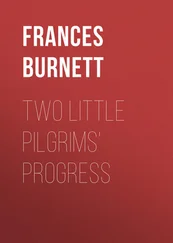“I’m knocking off, Terence,” he said, standing at the top of the terrace wall. “I’m going to walk down the road a bit. Do you mind finishing it by yourself?”
“Won’t take me about another ten minutes, not that.”
“By gosh, if I stooped just once more, my backbone would snap right out of me! Like a spring. How do you do it.”
“Guess it’s all in being used to it! I was born with a shovel in my hands. But it’s work, at that.”
“It is. Thanks a lot, Terence. How do you think it looks.”
“Looks fine. Yes, sir, in about two years it’ll make a fine show. Not much blossom next spring—”
“No?”
“No, they’ll want about a year’s growth of wood first, and to make some roots too — but then, by gorry, they’ll give you blaze enough — it ought to be a pretty sight. Got ’em in just in time, too — I can feel the frost in my sciatics already!”
They looked together along the row of lilacs by the Purington fence, as orderly as if they had been there forever. A patch of white sand glowed dimly at the foot of each, like a little circle of phosphorescence, and the dangling labels, too, shone white in the moonlight. Terence shook his head.
“A hundred!” he said.
“Felt more like a thousand!.. Well, good night, Terence, and I’ll see you Monday.”
“Yes, I’ll be over Monday with a nice load of manure, and put ’em to bed good.… Good night!”
“Good night.”
He heard the shovel strokes resume behind him, heard them still as he turned to the left to pass the Purington house, and then, as he stepped into the moonlight-stenciled street, he was engulfed abruptly in an astonishing silence. The crickets, all but a few, were still, now — their slower zeek — zeek — zeek — zeek was merely the moonlight made audible, the thin threnody of the moonlight itself. Peace be with you— pax vobiscum ! Lucky little devils, just to crawl into a hole in the ground, freeze quietly into sleep, and forget everything until another year, another summer! Another summer, another love. He walked quickly, the leaves rustling under his feet, retracing the steps that he had taken only a few hours before, when he had come back empty-handed — empty-hearted? — from the post office. Nora, silent, was a different, an unknown Nora, it wasn’t like her to be silent, it could mean only one thing. Perhaps she had finally decided to marry that architect chap from Clark College and settle down — perhaps he never would see her again. Would he mind? It had been good, it had been merry: a comic genius — the muse of comedy — had presided over the affair from the very outset: never, in all their clandestine meetings, had they had an unhappy moment — not even when she had been so sick that time under the ailanthus tree in the moonlit back yard. Another summer, another love! Had they been in love? Was he in love with her now? Not as he was in love with Ee — odd, too, how they had never once called each other by their Christian names, or even by any nicknames — nothing but “you,” “you.” On the telephone always—“Hello? Is that ‘you’?” “Yes, it’s ‘me’—is that ‘you’? And who is ‘you’?” ‘“ME!’”… And then her delicious giggle, muffled and averted as she turned her face away from the telephone, the so characteristic half-checked giggle, as if it were all so dreadfully naughty, the whole thing — so dreadfully and delightfully naughty, but so dreadfully nice too, and himself and herself the naughtiest of all naughty people in a naughty but enchanting world! Enchanting, yes — the word was like a pang.… But had he really been in love? For the oddest thing of all was the way in which the first few months of the affair, so gay and light-hearted, had actually given him back something precious and lost in his relationship with Enid. The something that had been lost, or overlaid, after the birth of Buzzer; as if some kind of bloom, or illusion, had vanished, or been obscured, on the sudden intrusion of that so different reality. Yes, childbirth — who could have foreseen the effect of childbirth? That butcher-shop and meaty reality — as Paul so brutally put it, and quite right too! — was something for which love’s young dream hadn’t at all been prepared. A loss of belief! And Nora — dear delightful humorous Nora! — had somehow magically restored it. How the devil did such things happen? And why the devil weren’t they admitted! Shams everywhere, shams in love, shams in hate, shams in marriage or divorce, shams deeply bedded even in the secret self. The eye loving before the heart or hand admits, the heart hating when the hand delights. It was all a mess.…
BAKER STREET: TOWN LANDING.
He turned under the silver-gray signpost, proceeded down the sloping sand road towards Jim Connor’s house, which stood high and dark at the river’s edge. One light in an upstairs window, one light downstairs — somebody must still be about. A figure detached itself from the shadows of the porch, came uncertainly down the wooden steps into the moonlight — it was Jim, wearing the perpetual cap, pulled down over his eyes, a cigar tip glowing under the sharp visor. The cap that was never off, even indoors.
The half-shadowed prison-blanched face was smiling, the effect was oddly as of a secret smile existing by itself — only when one came nearer could one see the kind eyes in the shadow of the cap-visor. Typical, too — the watchful kindliness always a little in retreat, a little on guard. He remembered, suddenly, the time when Jim had come down from Taunton to spend the night, and when, trying to wake him in the morning, he had had to touch his shoulder — the poor devil had jumped half out of bed, terrified.
“Hello, Jim?”
“Hi, Timothy, old kid. What are you doing round here so late? Pretty late for you domestic fowls, isn’t it?”
Old kid — that absurd favorite phrase of his.
“Domestic — what about yourself!”
“Oh, no, not me! I guess I was feeling a little depressed by it. I thought I’d just get a breath of this nice sea air before I turned in.”
The voice sounded a shade sad, a shade tired, the gray-sweatered figure turned slowly, they walked down past the house to the beached canoe — it looked like Paul’s — at the water’s edge. In the shadow of the house, they stood still, the water lapping softly, sibilantly, on the sand, quarreling against the stone piers which supported the moonlit verandah above them.
“Yes, the sea air smells good after all this sheer domesticity.”
“Anything wrong?”
“Well, I guess the girls don’t like it much. I have a feeling they don’t like it much. You’d think they’d at least know a little something about cooking, wouldn’t you, or be willing to try? We haven’t had a decent meal in two days. You get tired of sardines! And Kitty picking on Karl, and neither Kitty nor Lorna wanting to do any of the housework — yeah, this sea air smells good!”
He smiled again under the visor, but the smile was melancholy and explanatory, he looked tired.
“Maybe they’ll get used to it. Sometimes I think you expect too much of human nature, Jim—”
“Do I? Maybe I do. I hadn’t thought of it. Lorna has a lot of talent, you know, she ought to be practicing, this is her chance to practice, with a good piano — if only Kitty would just try to take hold of things — but she’s not much like your Enid. No, old kid, you’ve sure got a jewel there!”
“I’m glad you like her.”
“A wonderful girl, a real woman — and beautiful, too. I’m sorry she doesn’t like me—”
“So am I, Jim; but you know how women are.”
“Sure. Don’t I just?… Did you have anything on your mind, Timothy? I haven’t seen you much.”
Читать дальше












